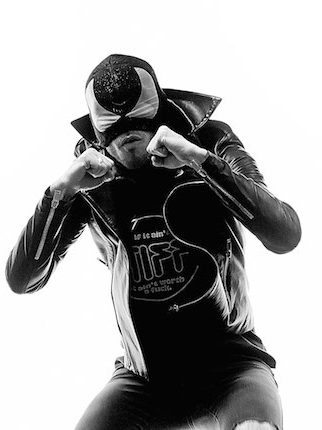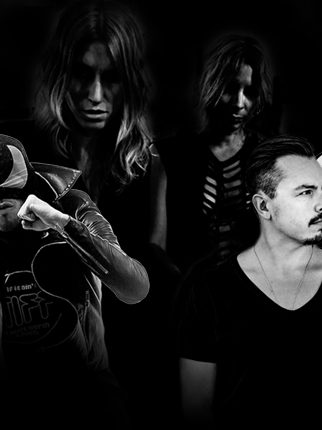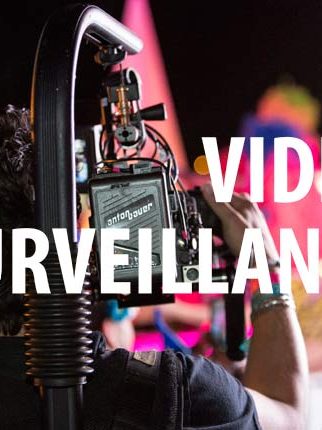Behind the Mask: The Genius of Sir Bob Cornelius Rifo
The rare few who’ve gazed directly into the eyes of Sir Bob Cornelius Rifo know there’s an undeniable erudition surging from within. The masked mastermind behind electro punk act the Bloody Beetroots seldom shows his bare face, his head always covered by his now-infamous Spider-Man-inspired, black-and-white Venom disguise. Beyond a marketing gimmick, the Bloody Beetroots’ vivid imagery stands as an extension to the empowering noise raging within Rifo’s music.
Nearing a decade into his career, Rifo has left a lasting imprint on dance culture since launching the Bloody Beetroots in late 2006. His riot-inducing electro house sound is equally powered by the revolutionary spirit of punk rock, the futuristic force of electronic music, and a DIY mentality. His is the voice of artistic independence, one which shouts rather speaks.
It’s all the more reason Rifo has come full circle to rejoin Steve Aoki and the Dim Mak Records crew for his newly launched SBCR project, a club-oriented take on the free-for-all anarchy he launched with his raucous debut album, Romborama, released via the label in 2009. His new SBCR alias abandons the polished superstar approach and crossover appeal of his 2013 album, Hide via Ultra Music, and instead sees Rifo return to his uproarious ways. SBCR is the latest development from a wiser, more experienced, and somehow louder Rifo.
The Bloody Beetroots forever cemented their influence with the 2009 electro house classic “Warp 1.9” featuring a screaming Aoki on vocals. Now six years later, Rifo expands his legacy with a set of three EPs under the SBCR moniker. The first installment, SBCR & Friends Vol. 1, continues the mayhem captured in Romborama, with the commanding “The Grid” invoking a movement on its own. The second volume, SBCR & Adversaries Vol. 2, adds a balance of frenetic energy, as heard on “Spider,” and ethereal melodies via “Rise & Fall,” which showcases Rifo as the evolved songwriter he’s now become.
With the third and final SBCR EP still to come, we dive behind the mask and dig into the genius of Sir Bob Cornelius Rifo.
Nowadays, artists talk about music as a product and not as art. Fans and the music industry treat musicians as a product, not artists. It’s almost as if artists are selling their image rather than their music.
I used to do promo in a totally different way. Now the way we communicate with people, the music is the last thing of all when promoting yourself. If you promote your brand, then it seems [you promote] that brand, you promote your face, then eventually the music, which is kind of crazy to me.
Image first, then music second. That’s why you use the mask.
I was trying to use the mask as a catalyst to get people involved with my music. Now it seems like there’s a big misunderstanding about it. Not only for my mask, but for the public image of an artist.
Was the mask your attempt to keep the attention away from you as a person and focus it on your music?
That was the main purpose.
Do you think that worked?
Now they see the mask first.
“This project doesn’t give a fuck about what works for the market. But it gives a fuck about what works for the human.”
Was that deliberate?
No. I decided to use the mask, first of all, because I’m from Venice, and we have a strong culture of masks. The power of iconography is crazy because one second you can be recognizable and drive people to your world. But it seems people spend a lot of time on the image and they don’t really care about the music, so they sell the image part. But where is the substance?
SBCR is your new project. You’re taking it back to your electro punk, DIY roots.
It’s like a project from scratch. I want to try to deliver myself musically differently; it’s very club orientated. It is what used to be the Bloody Beetroots at the very beginning of the story. I want to try to follow the same process. I want to play clubs, try to create an intimate show with people. I love playing for people in the club just because I want to recreate that kind of vibe. I want to shake their hands. I want to give them energy and I want energy back to create something real with substance, with that vibe of revolution we used to create back in 2007.
You have three EPs coming via SBCR. Is there a theme or message that ties the three EPs together? Or are they separate entities?
The glue is the electronic experiment of the contemporary music. That’s the glue that puts everything together. But there’s going to be like a big transformation on what I’m doing. It’s going to be a progression.
 The SBCR sound is a big jump from Hide, which was released two years ago. Hide was a beautiful album with major collaborations, including a track with Paul McCartney, and a full band.
The SBCR sound is a big jump from Hide, which was released two years ago. Hide was a beautiful album with major collaborations, including a track with Paul McCartney, and a full band.
There’s a big gap between the two, but because Hide is very crossover. I wanted to do crossover with that album. SBCR is not crossover at all. It’s very club-oriented. It’s made to be electronic and that’s it.
When you have so many projects and so many monikers—the Bloody Beetroots, SBCR, the Bloody Beetroots Death Crew 77, Rifoki, your hardcore punk collaboration with Steve Aoki—why is it important to keep those identities separate?
They’re all part of my personality. I think every one has different phases. You want to express yourself, and when you want to express yourself you deliver stuff. It doesn’t really matter what you deliver, but just deliver. I feel I have the need to express myself, to give the people what I think about music. And I listen to a lot of music genres, and that’s why I feel the need to try different stuff as well.
It’s my world. I always say that my world is chaos and confusion because it’s true. It’s the reality I live. My language is music. I always say I’m not really good at talking, and that’s the reason why I make music because that’s my way to talk.
It sounds like music is your primary form of communication, but do you feel like your other outlets allow to you communicate whatever you’re trying to communicate?
Absolutely. Photography is a big deal for me, too. I think photography is important for me because when I start to make a new song, I start from a title, and the title gives you a picture of what you’re going to do. You’re inspired by a picture. That’s why photography is such a big deal to me; its part of my expression. I wish I had time to take more pictures than I could. It’s important, visually as part of the deal.
Do you feel like you have multiple personalities? Or is it one personality with multiple faces?
I think it’s structured personality, and it’s probably a persona acting with different faces, but probably different colors of the personality. Faces could be like something not true, you know? I prefer to talk about the colors, so yes I have different colors.
Do you feel like all of your worlds coexist? Or do you feel like it’s all one big, chaotic mess?
It’s all connected for me. It’s all a big web.
You’re one of the few acts in electronic music that is very closely associated to punk rock and rock music, two timeless genres and sounds. Do you think electronic music is timeless?
I don’t think electronic music is timeless because it changes really, really fast because it’s coordinated by technology. That’s probably the big issue that would be experiencing with electronic music: not making history with this kind of music.
 Do you think it’s too late to begin making history with electronic music?
Do you think it’s too late to begin making history with electronic music?
No, it’s not too late. It’s never late. It all matters how much culture we want in this electronic scene, and we need to have substance at this point. It’s important, or we’re going to set on fire to all the records like we did back in the day with disco music. We cannot destroy the scene.
Are we?
We’re going to destroy the scene if we keep going and delivering stuff without substance because people are going to get tired of that.
You’ve reconnected with Dim Mak for SBCR after spending some time signed to Ultra Music, which was absorbed by Sony. Do you think SBCR would work with a major label?
I don’t know if SBCR would work with something corporate because I can’t make my final choice, and this is not the nature of this project. This project is made to experiment. This project doesn’t give a fuck about what works for the market. But it gives a fuck about what works for the human, and the human in this case is me. I want to make experiments. I really want to express what I feel.
If the Bloody Beetroots could lead a revolt via music and art, what would you want to change about the world?
Try to preserve the history, that’s my revolution. And with that we can change the world. There’s so much to learn from history, it’s all already written. You just have to read it and to study and deliver something good.
Follow SBCR on Facebook | Twitter | SoundCloud
Follow the Bloody Beetroots on Facebook | Twitter | SoundCloud




